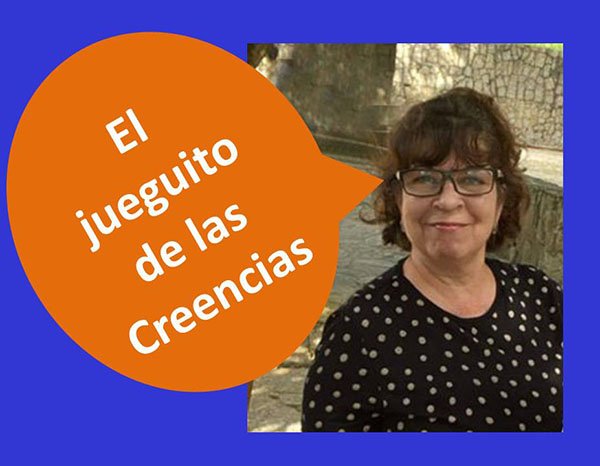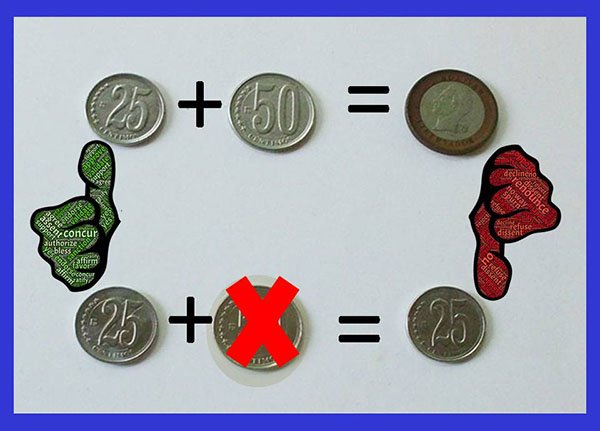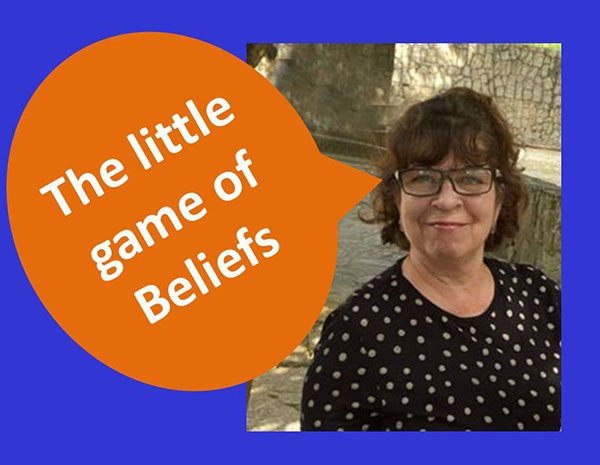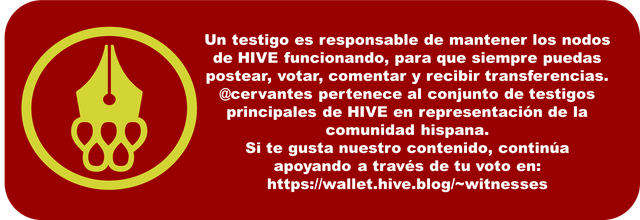
Desde las creencias que hemos ido aceptando a través de la familia, la cultura y la autoridad construimos ese marco que nos sirve de referencia y con ello vamos dando respuesta a las diversas situaciones que se nos presentan. La mayoría de estas creencias las tenemos de forma inconsciente pero, aún cuando no las reconozcamos, desde ellas actuamos.
Para la vida en general y para el emprendedor en particular es importante reconocer estas creencias porque en ellas van muchas de nuestras actitudes y las relaciones que establecemos con conceptos como: dinero, trabajo, prosperidad, abundancia.
Una de las maneras en que se van instalando estas creencias son con esos mensajes que escuchamos con constancias y que de alguna manera se van quedando en ese rincón de la mente, que en el momento menos oportuno afloran, veamos un ejemplo:
Mi abuela era muy refranera y tenía un dicho que solo se lo he escuchado a ella y lo decía cuando de su latica, donde metía los ahorros, tenía que sacar dinero para algo distinto a lo que tenía previsto, que tal parece era frecuente porque escuche con tanta insistencia esas palabras que aún las recuerdo:
El que nace para medio, en su triste vida fatal, cuando llega a real y medio siempre se le pierde un real.

¡Dios que mensaje tan horrible! Pero vamos a comentarlo brevemente y veamos cuales son las “enseñanzas” que nos deja:
A.- La predestinación: el que nace para medio. Si sientes que naciste para medio este mensaje es para ti y no hay nada que puedas hacer para cambiar esa condición.
B.- La fatalidad: esta persona tiende a ver la vida desde la tragedia, el drama, la adversidad.
C.- La sentencia: siempre se le pierde un real: ni que hagas lo que hagas vas a “salir de abajo”, “siempre” aparecerá algo que no te permite avanzar.
@morito13 en su post Cómo hacer uso del Botón SDC nos invita a responder la siguiente interrogante:
¿Cómo han influido tus creencias en el desempeño de tu negocio?
Cuando en el año 2016 decido emprender en el área del Crecimiento personal, venía de un emprendimiento exitoso y en cierta manera consolidado como orfebre, sin embargo, por errores que en algún momento les comentaré, decidí que ya no más y enfoqué todas mis energía, entusiasmo y pasión en este nuevo emprendimiento, en el que me venía preparando hacia años pero siempre pensado como “consumo personal”.
Muy montada en mi proyecto, creando cursos y adquiriendo más conocimientos, de pronto pasó como una ráfaga un pensamiento inquietante:
— Ah, valdrá la pena esto que estoy haciendo, hay tanta gente trabajando en crecimiento personal ¿Cómo voy a poder competir con ellos?; ¿cursos, quien tiene real ahorita para pagar cursos?
Allí estaban mis creencias, jugando dentro de esa formula desgastadora de: Yo gano –tu pierdes, porque más allá de las dudas razonables lo que emergía eran esas creencias limitantes: no lo vas a lograr; hay gente mejor preparada que tu; la gente no tiene dinero para esto, no importa cuánto esfuerzo y empeño le pongas…
Lo que no sabía mi pensamiento es que ya no me agarraba desprevenida y que tenía herramientas para darle un parado, de tal manera que enseguida me puse a trabajar en ello:
Comencé con esa expresión “vale la pena”. Que pena ni que nada: pena es dolor, sufrimiento y esto que estoy haciendo, me llena de entusiasmo, alegría, buena vibra, ilusión, así que sí vale el esfuerzo que estoy poniendo en ello.
No lo vas a logar: ¿Por qué no? Si tengo la preparación, conozco y sé de lo que estoy hablando, además que poseo cualidades que me fortalecen, por otro lado, sé deconstruir mis creencias y te lo estoy demostrando querido pensamiento mío, así que: — Si voy a lograrlo porque tengo con que.
Hay gente mejor que tu: Siempre amigo mío habrá gente mejor preparada que yo, pero también gente menos preparada que yo en éste conocimiento, así que puedo apoyar y aportar desde mi saber y experiencia.
La gente no tiene dinero para esto: todos tenemos necesidades y problemas múltiples, yo estoy ofreciendo una propuesta de valor válida, viable, asequible, habrá quien decida tomarla. Parto de la idea que en asuntos de dinero, cuando queremos algo, buscamos la manera de obtenerlo.
Y de esta manera fui contrastando mis creencias con otra realidad distinta que le voy proponiendo a mi mente.
Como emprendedores nos llegan dudas, las cuales muchas se encuentran arraigadas en ese Sistema de Creencias (SDC) que se convierten en limitantes para nuestro hacer. Identificarlas, nos ayuda a desarmarlas y enfocarnos en aquello que requerimos para reprogramarnos.
Y al hablar de esta reprogramación tomemos en cuenta que no se trata solo de repetirnos infinidad de veces “Yo si puedo”. No, ese yo si puedo tienen que estar avalado en el hacer, cuando unimos pensamiento y acción estamos activando esa congruencia que nuestra mente comienza a percibir como que el asunto está cambiando, que ya no te puede decir: — Mira es que tú no puedes o no sabes—, porque tu pensamiento y acción lo están haciendo.
Como a mí me encanta un reto o como me dice mi hija, que soy "picada" cuando esa vocecita comienza a susurrar “tu no pued…” enseguida la atajo y le digo, ¿Cómo que no? Ya tu verás que sí.
Por supuesto que hay limitantes externas, circunstanciales que con empeño, esfuerzo, trabajo, dedicación podemos superar. Las limitaciones que nos ponemos con nuestra mente hay que trabajarlas con más ahínco porque, posiblemente, de ello dependa poder superar esas que están afuera.
Y hablando de este pensamiento limitante me parece que sería constructivo trabajar en esa idea generalizada de que “emprender es difícil” porque de entrada estamos colocando el listón a una altura que nos parece inalcanzable.
Si el emprender lo asociamos con la idea de que es apasionante, retador, motivante, que nos llena de optimismo y expectativas positivas estoy segura que parte de este temor, que a veces nos ronda, se diluye, dándonos mayor seguridad en lo que somos y hacemos.

In English

From the beliefs that we have been accepting through family, culture and authority, we build that framework that serves us as a reference and with it we respond to the different situations that we are presented with. Most of these beliefs we have unconsciously, but, even when we do not recognize them, we act from them.
For life in general and for the entrepreneur in particular, it is important to recognize these beliefs because many of our attitudes and the relationships we establish with concepts such as: money, work, prosperity and abundance are based on them.
One of the ways in which these beliefs are installed are with those messages that we hear with constancy and that somehow are staying in that corner of the mind, that at the least opportune moment emerge, let's see an example:
My grandmother was very refranera and had a saying that I have only heard from her and she said it when she had to take money out of her savings account for something other than what she had planned, which seems to have been frequent because I heard those words so often that I still remember it:
He who is born for half, in his sad fatal life, when he reaches real and a half he always loses a real.

God, what a horrible message! But let's comment on it briefly and see what "teachings" it leaves us:
A.- Predestination: the one who is born for half. If you feel that you were born for the middle, this message is for you and there is nothing you can do to change that condition.
B.- Fatality: this person tends to see life from tragedy, drama, adversity.
C.- The sentence: he always misses a real one: not that whatever you do you are going to "get out from under", "always" something will appear that does not allow you to move forward.
@morito13 in his post How to make use of the SDC Button invites us to answer the following question:
How have your beliefs influenced your business performance?
When in 2016 I decided to undertake in the area of Personal Growth, I was coming from a successful and somewhat consolidated venture as a goldsmith, however, due to mistakes that I will tell you about at some point, I decided that no more and focus all my energy, enthusiasm and passion in this new venture, in which I had been preparing myself for years, but always thought of as "personal consumption".
I was very excited about my project, creating courses and acquiring more knowledge, suddenly a disturbing thought came to me:br>
- Ah, it will be worth it, there are so many people working in personal growth, how will I be able to compete with them; courses, who has real money right now to pay for courses?
There were my beliefs, playing within that wearing formula of: I win - you lose, because beyond the reasonable doubts, what emerged were those limiting beliefs: you are not going to make it; there are people better prepared than you; people do not have money for this, no matter how much effort and effort you put into it...
What my thinking didn't know was that it didn't catch me off guard and that I had the tools to stop it, so I immediately started working on it:
I started with that expression "it's worth it". What a pity, nothing: pity is pain, suffering and what I am doing fills me with enthusiasm, joy, good vibes, illusion, so it is worth the effort I am putting into it.
You are not going to make it: Why not? If I have the preparation, I know and I know what I am talking about, besides I possess qualities that strengthen me, on the other hand, I know how to deconstruct my beliefs and I am demonstrating it to you, my dear thought, so, yes, I am going to make it because I have the preparation, I know and I know what I am talking about: - Yes I am going to make it because I have what it takes.
There are people better than you: Always my friend, there will be people better prepared than me, but also people less prepared than me in this knowledge, so I can support and contribute from my knowledge and experience and always with the aim of learning more every day.
People do not have money for this: we all have multiple needs and problems, I am offering a valid, viable, affordable value proposition, there will be those who decide to take it. I start from the idea that in money matters, when we want something, we look for a way to get it.
And so I contrasted my beliefs with a different reality that I am proposing.
As entrepreneurs, we have doubts, many of which are rooted in our Belief System (BDS) and become limiting for our actions. Identifying them helps us to disarm them and focus on what we need to reprogram ourselves.
And when talking about this reprogramming, let's take into account that it is not only about repeating "I can do it" countless times. No, that "I can" has to be endorsed in the doing, when we join thought and action we are activating that congruence that our mind begins to perceive that the matter is changing seriously, that it can no longer tell you: - Look, you can't or you don't know -, because your thought and action are doing it.
As I love a challenge, when that little voice starts whispering "you can't...", I immediately attack it and tell it: "You can't...". I immediately cut it off and say, "What do you mean, you can't? You will see that I can.
Of course there are external, circumstantial limitations that with effort, hard work and dedication we can overcome. The limitations that we put on ourselves with our mind we have to work harder because, possibly, it depends on this to overcome those that are outside.
And speaking of this limiting thought, it seems to me that it would be constructive to work on the generalized idea that "entrepreneurship is difficult" because from the outset we are setting the bar at a height that seems unattainable to us.
If we associate entrepreneurship with the idea that it is exciting, challenging, motivating, that it fills us with optimism and positive expectations, I am sure that part of this fear, which sometimes haunts us, is diluted, giving us more confidence in what we are and what we do.

Translated with www.DeepL.com/Translator (free version)
Fuente de imágenes: Propias modificadas en PowerPoint - 1



MIS REDES SOCIALES



Cortesía de la comunidad


Te invito a apoyar este proyecto como witnes y a formar parte de esta gran comunidad uniéndote a su Discord en el siguiente enlace:
Discord de la comunidad Cervantes


Be Entrepreneur






